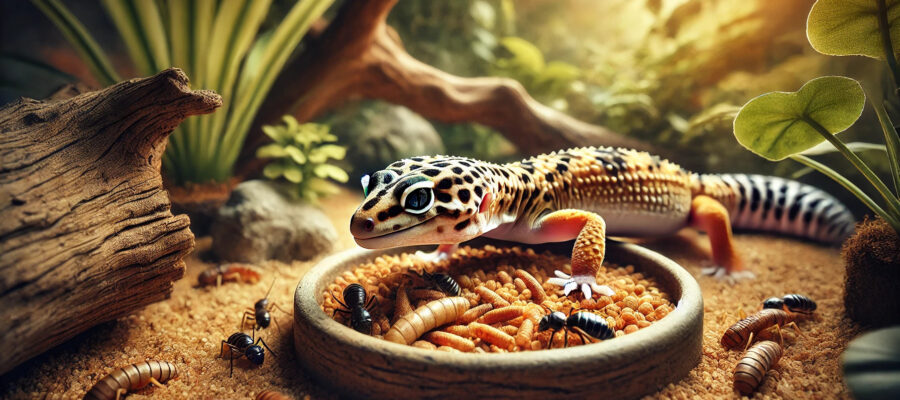When it comes to feeding your leopard gecko, picking the right insects can make a world of difference to their health and happiness. With so many options out there, it can get a bit confusing. Let’s break down which insects are ideal, which ones to avoid, and a few simple tips on how to choose the best diet for your little reptile.
Why Insects Are Essential for Leopard Geckos
Leopard geckos thrive on a diet of insects because they’re naturally insectivores. In the wild, they feast on bugs they can hunt down. As pets, they rely on us to bring the same nutritional balance to their bowls. Feeding them the right insects doesn’t just keep them full—it provides essential vitamins, minerals, and proteins that they need to grow and stay active.
But not all insects are equal! Some offer better nutrition, while others could cause more harm than good.
Best Insects for Leopard Geckos
Here are a few top choices when it comes to nutritious, safe insects for your gecko. These insects are widely available, easy to care for, and provide balanced nutrition for your pet.
- Crickets
Crickets are often considered a staple food for leopard geckos. They’re affordable, easy to find, and contain a solid protein-to-fat ratio. Crickets also have a bit of a “hunt factor,” which can stimulate your gecko’s natural instincts as they chase them around. - Mealworms
Mealworms are another solid choice. These worms are rich in protein and easy to store. Since they’re slower-moving, they’re ideal if you’re worried about insects escaping the tank. However, mealworms are a bit high in fat, so they’re best served as part of a varied diet. - Dubia Roaches
Not everyone loves the idea of keeping roaches, but Dubia roaches are a nutritional powerhouse. They’re high in protein, low in fat, and easy to digest, making them an excellent choice for leopard geckos. Plus, they don’t smell or make noise, and they don’t climb smooth surfaces, which keeps things simple for pet owners. - Waxworms
Think of waxworms as treats for your leopard gecko. They’re super tasty to most geckos, but they’re also high in fat. Use them sparingly—maybe once or twice a week at most. Too many waxworms can lead to obesity and other health issues. - Silkworms
Silkworms are nutritious and high in moisture, which can be beneficial if your leopard gecko needs more hydration. However, they can be a bit more expensive and aren’t as widely available as crickets or mealworms. If you can find them, they’re definitely worth a try.
Insects to Avoid
While many insects are safe, a few are best avoided:
- Fireflies and Lightning Bugs: These are toxic to leopard geckos and can be fatal if ingested.
- Wild-Caught Insects: Although it might seem natural to offer your gecko a wild-caught bug, these can carry pesticides and parasites. Stick to store-bought insects that are specifically bred for pet consumption.
- Beetles: While some geckos might nibble on beetles, they have hard shells that are difficult to digest and can cause impaction, a serious health issue in leopard geckos.
If you’re unsure about an insect, it’s always better to err on the side of caution. There are plenty of safe options available.
Gut-Loading for Extra Nutrition
Have you heard of “gut-loading”? It’s when you feed nutritious foods to the insects before giving them to your gecko. By gut-loading crickets, mealworms, or roaches with nutrient-dense foods (like leafy greens, carrots, or sweet potatoes), you make them even more beneficial. This way, your gecko is getting added vitamins and minerals they might otherwise miss out on.
Dusting with Calcium and Vitamins
Leopard geckos need calcium and vitamins to stay healthy, so it’s a good idea to dust insects with calcium powder before feeding. Calcium helps support bone health, while a vitamin mix can provide other essentials. Many pet owners use a simple rotation, like dusting with calcium five days a week and a vitamin mix on two. This helps avoid over-supplementing while keeping your gecko’s diet balanced.
For more details on the importance of gut-loading and dusting, check out our guide on The Easy Way to Keep Your Feeder Insects Hydrated.
Feeding Schedule
It’s best to feed young leopard geckos daily, as they’re growing and need the extra energy. Adult geckos, on the other hand, do well with feeding every other day. This schedule helps keep their diet in balance and prevents overeating.
Quick Tips for Leopard Gecko Feeding
- Use a Shallow Dish: Place insects in a shallow dish in the tank. This keeps them contained and reduces the risk of escape.
- Monitor for Leftovers: Remove uneaten insects after feeding. This prevents the insects from nibbling on your gecko or spoiling in the enclosure.
- Keep It Varied: Just like us, geckos enjoy a bit of variety. Rotate their meals between different types of insects to keep them engaged and ensure they’re getting a range of nutrients.
In Summary
Choosing the right insects for your leopard gecko can make a big difference in their overall health and happiness. Crickets, mealworms, Dubia roaches, waxworms (in moderation), and silkworms are all fantastic options, while fireflies and wild-caught bugs should be avoided. A little effort with gut-loading and dusting goes a long way in providing a balanced diet for your pet.
Want more tips on keeping your gecko healthy? Check out our post on Leopard Gecko Feeding Frequency to create a schedule that works best for them.
By making these simple choices, you’ll ensure that your leopard gecko stays happy, healthy, and well-fed!
Get Your Free Leopard Gecko Care Checklist!
Are you ready to give your leopard gecko the best care possible? Download our FREE PDF e-book featuring a comprehensive care checklist!
This handy guide covers everything from habitat setup to feeding and health tips, ensuring your gecko thrives.
👉 Download your checklist now!




